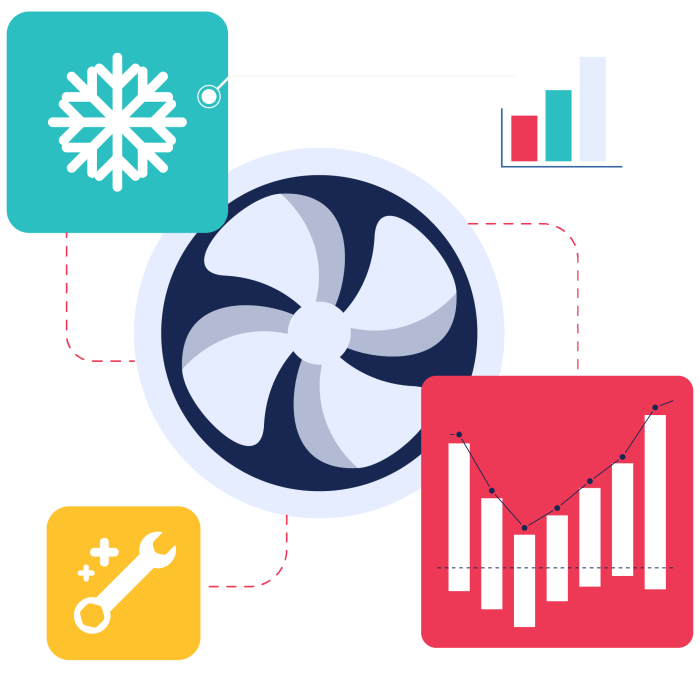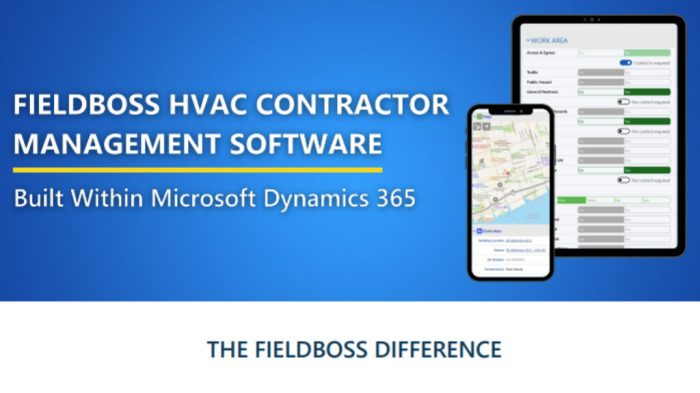HVAC field service software revolutionizes how HVAC businesses operate, transforming chaotic scheduling and inefficient paperwork into a streamlined, technologically advanced system. This software empowers technicians with real-time access to customer information, job details, and inventory, leading to quicker response times, reduced errors, and ultimately, increased customer satisfaction. The integration of mobile capabilities further enhances efficiency, allowing technicians to update job status, generate invoices, and capture signatures on the go.

Source: trinetraiway.com
Beyond the immediate benefits of improved operational efficiency, HVAC field service software offers valuable data-driven insights. By tracking key metrics like job completion times, service call frequency, and parts usage, businesses can identify areas for improvement, optimize resource allocation, and make informed decisions to enhance profitability and growth. This data-driven approach is crucial in today’s competitive landscape, allowing businesses to stay ahead of the curve and deliver exceptional service.
The HVAC industry is a demanding one, requiring technicians to be highly skilled, efficient, and responsive. Managing schedules, dispatching technicians, tracking inventory, and handling customer communications can quickly become overwhelming without the right tools. This is where HVAC field service software steps in, offering a comprehensive solution to streamline operations and boost profitability. This detailed guide will explore the key features, benefits, and considerations when choosing the best HVAC field service software for your business.
Key Features of Top-Rated HVAC Field Service Software
Modern HVAC field service software goes far beyond basic scheduling. The best platforms integrate several crucial functionalities to create a seamless workflow. These features often include:

Source: frontu.com
Scheduling and Dispatching
- Real-time scheduling: Visual calendars and drag-and-drop functionality allow for easy scheduling and rescheduling of appointments, minimizing conflicts and maximizing technician utilization.
- Automated dispatching: Intelligent algorithms optimize routes based on technician location, skills, and job urgency, reducing travel time and improving response times. This is particularly useful for managing multiple technicians across a wide service area.
- Service area management: Define service territories and assign technicians accordingly, ensuring efficient coverage and minimizing travel costs. This also helps with better customer allocation based on proximity.
- Appointment reminders and notifications: Automated reminders sent via SMS, email, or app notifications reduce no-shows and improve customer satisfaction.
Job Management and Tracking
- Job creation and assignment: Easily create and assign jobs to technicians, including details like customer information, equipment details, and required services.
- Real-time job tracking: Monitor technician progress in real-time, allowing for proactive management and efficient resource allocation. Knowing the location and status of each job helps in managing unexpected delays.
- Digital work orders: Eliminate paperwork by using digital work orders that can be accessed and updated by technicians in the field, ensuring accurate record-keeping and reducing administrative overhead.
- Inventory management: Track inventory levels, monitor stock, and automate reordering processes to avoid costly downtime due to missing parts.
- Mobile accessibility: Technicians can access job details, customer information, and inventory data directly from their mobile devices, eliminating the need for constant communication with the office.
Customer Relationship Management (CRM)
- Customer database: Centralized database storing all customer information, including contact details, service history, and preferences.
- Communication tools: Integrated communication tools for seamless interaction with customers, including email, SMS, and in-app messaging.
- Customer portals: Allow customers to schedule appointments, view invoices, and access service history online, improving customer engagement and satisfaction.
- Feedback and review management: Collect customer feedback and reviews to improve service quality and build a positive online reputation.
Reporting and Analytics
- Performance dashboards: Real-time dashboards providing key performance indicators (KPIs) such as technician productivity, revenue, and customer satisfaction.
- Customizable reports: Generate customized reports to track key metrics and identify areas for improvement. This allows for data-driven decision-making.
- Financial reporting: Generate reports on revenue, expenses, and profitability to monitor financial performance and identify trends.
Integration with Other Systems, Hvac field service software
Many HVAC field service software solutions offer seamless integration with other business systems, such as accounting software, CRM platforms, and payment gateways, creating a more efficient and streamlined workflow. This reduces data entry and minimizes errors.

Source: fieldboss.com
Benefits of Using HVAC Field Service Software
Implementing HVAC field service software offers numerous benefits, including:
- Increased efficiency and productivity: Streamlined workflows and automated processes lead to increased efficiency and higher technician productivity.
- Improved customer satisfaction: Faster response times, improved communication, and personalized service enhance customer satisfaction and loyalty.
- Reduced operational costs: Automated processes, optimized routing, and reduced paperwork lead to significant cost savings.
- Better inventory management: Reduced stockouts and improved inventory control minimize downtime and increase profitability.
- Enhanced data-driven decision-making: Real-time data and reporting tools provide valuable insights to improve business strategies.
- Improved technician satisfaction: Simplified workflows and mobile accessibility enhance technician job satisfaction and reduce stress.
Choosing the Right HVAC Field Service Software
Selecting the right software requires careful consideration of several factors:
- Business size and needs: Choose a solution that scales with your business and meets your specific needs.
- Features and functionalities: Prioritize features that align with your business requirements and workflows.
- Integration capabilities: Ensure the software integrates with your existing systems.
- Cost and pricing: Compare pricing models and choose a solution that fits your budget.
- Customer support: Look for a vendor that provides excellent customer support and training.
- User-friendliness: The software should be intuitive and easy to use for both office staff and technicians.
Frequently Asked Questions (FAQ)
- Q: What is the cost of HVAC field service software? A: The cost varies depending on the features, number of users, and vendor. Expect a range from monthly subscription fees to one-time purchase options.
- Q: How long does it take to implement HVAC field service software? A: Implementation time varies depending on the complexity of the software and your business processes. It can range from a few weeks to several months.
- Q: What kind of training is required? A: Most vendors provide training resources, including online tutorials, webinars, and on-site training. The extent of training will depend on the software’s complexity.
- Q: Can the software integrate with my existing accounting software? A: Many HVAC field service software solutions offer integration with popular accounting software packages. Check with the vendor to ensure compatibility.
- Q: What if I need custom features? A: Some vendors offer customization options to tailor the software to your specific needs. This might involve additional costs.
Conclusion
Investing in the right HVAC field service software is crucial for optimizing operations, improving customer satisfaction, and boosting profitability. By carefully considering your business needs and selecting a solution with the right features and functionalities, you can significantly enhance your business’s efficiency and competitiveness. Take the time to research different options and choose a software that best suits your unique requirements.
References
While specific software names are avoided to maintain neutrality, general information on field service management software can be found on websites such as:
- Gartner (for industry analysis and reports)
- Capterra (for software reviews and comparisons)
- Software Advice (for software selection guidance)
Call to Action
Ready to streamline your HVAC business and experience the benefits of field service software? Contact us today for a free consultation and discover how we can help you find the perfect solution for your needs!
In conclusion, the implementation of HVAC field service software represents a significant step towards modernization and optimization within the HVAC industry. By embracing technology and leveraging the power of data-driven insights, businesses can enhance operational efficiency, improve customer service, and achieve sustainable growth. The benefits extend beyond immediate cost savings, encompassing a holistic improvement in overall business performance and competitive positioning.
Commonly Asked Questions
What are the typical costs associated with HVAC field service software?
Costs vary greatly depending on the features, scalability, and vendor. Expect monthly subscription fees or one-time purchase options, ranging from hundreds to thousands of dollars annually.
How easy is it to integrate HVAC field service software with existing systems?
Integration capabilities differ across software providers. Some offer seamless integration with accounting software and other business tools, while others may require more complex setup procedures. It’s crucial to check compatibility before committing.
What level of technical expertise is required to use HVAC field service software?
Most modern HVAC field service software is designed with user-friendliness in mind. While some initial training might be necessary, the interface is typically intuitive and requires minimal technical skills to operate effectively.
What security measures are typically included in HVAC field service software?
Reputable providers prioritize data security. Expect features such as data encryption, access controls, and regular security updates to protect sensitive customer and business information.